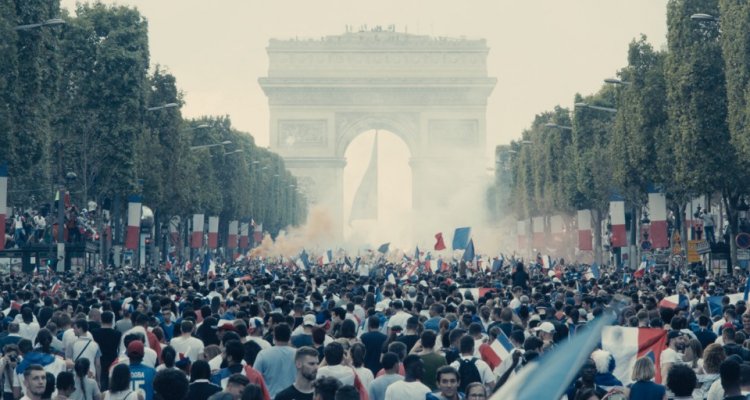The French Revolution is long since over. But in Ladj Ly’s “Les Misérables,” which premiered in competition at the Cannes Film Festival, a modern-day revolution takes root in the banlieues of Paris. And rather than disgruntled bread thieves and anti-monarchy rebels, this one galvanizes a fleet of young Afro-Parisians armed with Molotov cocktails and firecrackers. When a police squad tasked with patrolling the streets ventures into Les Bosquets, a notoriously crime-ridden, predominantly Black Muslim neighborhood outside Paris, a violent incident involving a stolen lion cub, a flare gun, and the injury of a civilian (captured on film via drone, no less) detonates a string of riots.
Focalized through the police group’s latest addition, Stéphane Ruiz (Damien Bonnard), Ly paints a once-notorious neighborhood overrun with crime as an intricate world with its own organizing schema. Opposing factions confront each other in the streets, namely one led by the unofficial “mayor” who struggles to protect his constituency (Steve Tientcheu) and another dominated by a traveling circus ring. Like most self-governed networks, this one runs on power, and all matters are resolved through backdoor blackmail and quid pro quo — even, and especially, those involving the police.
In the backseat, both literally and figuratively, Stéphane watches his colleagues wield authority in abusive ways. Chris (Alexis Manenti), the self-proclaimed “Pink Pig,” harasses teenagers with threats and racist, sexist epithets, lashing out violently. “I am the law!” he roars in one scene (an allusion that perhaps led to a few more laughs than Ly intended). Another officer, Gwada (Djibril Zonga), doesn’t incite nearly as much active confrontation, yet does nothing to stop it, either. After all, as their commanding officer says at the beginning of the film, “No solidarity, no team.” The team’s agenda must come first, despite how badly Stéphane wants to gratify the impulse to help the victims of their brutality. Alternately shot in drone footage and shaky handheld camera, the total instability and chaos of the situation are never in question.
Still, Ly makes it hard to paint these characters in broad strokes, no matter how we might try. Despite the permanent frown of concern etched on his face, Stéphane is no hero, both appalled by the cruelty he witnesses and complicit in it, a bystander as well as a perpetrator. Neither is Gwada, though his affecting scene at home with his mother reveals an underlying pathos. Even Chris, the obvious villain, greets his daughters after work, sinking back onto his couch with a beer. Of course, it’s possible to hate the bad guy who’s also a family man, but it’s admittedly much harder.
Among all of these characters, though, the most compelling is young Issa (Issa Perica), the teenage boy whose swollen, bruised face bears the brunt of the squad’s brutality. Forced to run for his life in a tormenting police chase, abandoned while unconscious in a stranger’s house, and trapped in a cage with a captive lion, Issa becomes the film’s modern answer to Gavroche, so young but already hardened by rage. If the film’s final standoff between Issa and the policemen is any indication, the power rests, albeit tenuously, with the people.
It’s somewhat of a shame that Ly elides most of the young civilians, instead aligning the camera’s perspective with the police squad. Unlike the film’s natural cinematic predecessor, “La Haine,” whose rap theme song advocates a much harsher approach toward the authorities, “Les Misérables” seems inclined to blame the system, not the pawns. “Remember, my friends,” reads a quote from the older “Les Misérables” at the end of the film. “There are no such things as bad plants or bad men. Only bad cultivators.” One wonders whether Ly has met his own characters. Surely, there are a few bad apples. [B+]

